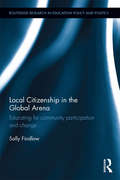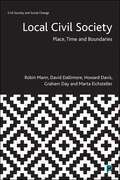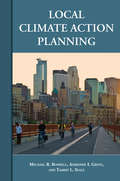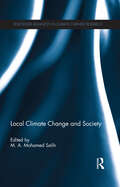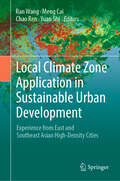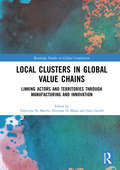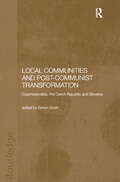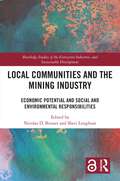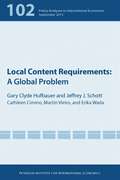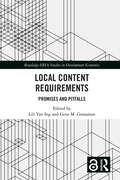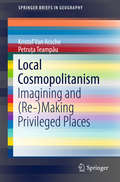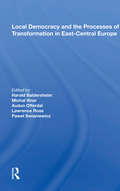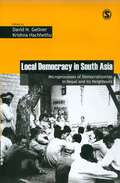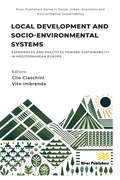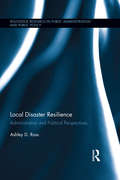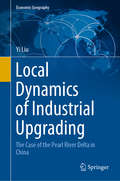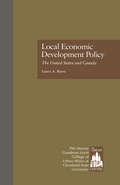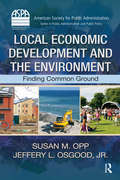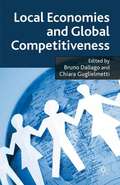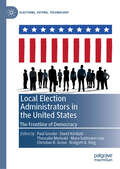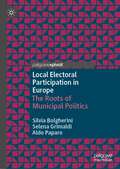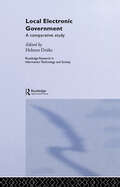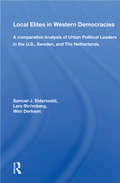- Table View
- List View
Local Citizenship in the Global Arena: Educating for community participation and change (Routledge Research in Education Policy and Politics)
by Sally FindlowLocal Citizenship in the Global Arena proposes a reconsideration of both citizenship and citizenship education, moving away equally from prevailing ‘global citizenship’ and ‘fundamental British values’ approaches towards a curriculum for education that is essentially about creating cosmopolitan, included and inclusive, politically-engaged citizens of communities local, national and global. Viewing education as both problem and solution, Findlow argues that today’s climate of rapid and unpredictable geopolitical and cultural re-scoping requires an approach to citizenship education that both reflects and shapes society, paying attention to relationships between the local and global aspects of political voice, equality and community. Drawing on a range of international examples, she explores the importance and possibilities of a form of education that instead of promoting divisive competition, educates about citizenship in its various forms, and encourages the sorts of open and radical thinking that can help young people cross ideological and physical borders and use their voice in line with their own, and others’, real, long-term interests. Successive chapters develop this argument by critically examining the key elements of citizenship discourses through the interrelated lenses of geopolitical change, nationalism, the competition fetish, critical pedagogy, multiculturalism, protest politics, feminism and ecology, and highlighting ways in which the situationally diverse lived realities of ‘citizenship’ have been mediated by different forms of education. The book draws attention to how we think of education’s place in a world of combined globalisation, localism, anti-state revolt and xenophobia. It will be of key interest to academics, researchers and postgraduate students in the fields of education, political science, philosophy, sociology, social policy, cultural studies and anthropology.
Local Civil Society: Place, Time and Boundaries (Civil Society and Social Change)
by Robin Mann David DallimoreEpdf and ePUB available Open Access under CC-BY-NC licence. Drawing on place-based field investigations and new empirical analysis, this original book investigates civil society at local level. The concept of civil society is contested and multifaceted, and this text offers assessment and clarification of debates concerning the intertwining of civil society, the state and local community relations. Analysing two Welsh villages, the authors examine the importance of identity, connection with place and the impact of social and spatial boundaries on the everyday production of civil society. Bringing into focus questions of biography and temporality, the book provides an innovative account of continuities and changes within local civil society during social and economic transformation.
Local Climate Action Planning
by Tammy L. Seale Michael R. Boswell Adrienne I. GreveClimate change is a global problem, but the problem begins locally. Cities consume 75% of the world's energy and emit 80% of the world's greenhouse gases. Changing the way we build and operate our cities can have major effects on greenhouse gas emissions. Fortunately, communities across the U.S. are responding to the climate change problem by making plans that assess their contribution to greenhouse gas emissions and specify actions they will take to reduce these emissions. This is the first book designed to help planners, municipal staff and officials, citizens and others working at local levels to develop Climate Action Plans. CAPs are strategic plans that establish policies and programs for mitigating a community's greenhouse gas (GHGs) emissions. They typically focus on transportation, energy use, and solid waste, and often differentiate between community-wide actions and municipal agency actions. CAPs are usually based on GHG emissions inventories, which indentify the sources of emissions from the community and quantify the amounts. Additionally, many CAPs include a section addressing adaptation-how the community will respond to the impacts of climate change on the community, such as increased flooding, extended drought, or sea level rise. With examples drawn from actual plans, Local Climate Action Planning guides preparers of CAPs through the entire plan development process, identifying the key considerations and choices that must be made in order to assure that a plan is both workable and effective.
Local Climate Change and Society: Local Climate Change And Society (Routledge Advances in Climate Change Research #1)
by M. A. Mohamed SalihAlthough the impacts of climate change are certainly global, its manifestations and subsequent consequences begin locally. Local Climate Change and Society examines how climate change has altered society’s relationship with the environment and particularly local communities to adapt to and mitigate climate change. The book analyzes the principles, practices and local responses to micro-level climate policies and interrogates the increasing role of local governments and local climate social movements induced by transnational corporations’ activities both above and below the equator. This book contains country and cross-country case studies and inter-disciplinary contributions written by academics, researchers and policy makers at the cutting edge of climate change knowledge. It aimed at students of environmental and climate change in the social sciences, academics, climate change public. Local climate change and society has direct appeal to professional staff concerned with environmental management, and policy makers supporting communities and municipalities in climate change adaptation and mitigation processes and activities at the at local level.
Local Climate Zone Application in Sustainable Urban Development: Experience from East and Southeast Asian High-Density Cities
by Ran Wang Chao Ren Meng Cai Yuan ShiThe study of local climate zones (LCZ) links urban morphology, land use and land cover types, human activity, and thermal properties, and provides a standard framework for studying urban climatic issues. In recent years, the LCZ scheme attracts more and more attention from climatologists, urban planners, environmental engineers, as well as architects due to its combination of urban climatic scientific research outputs and urban planning and morphology language. Urbanization and higher-density living, an ongoing and continued path of human development, brings various urban climatic and environmental problems. Urban development in a sustainable way is vital for high-density cities to build a comfortable living environment.This book is the first one presenting systematically the latest LCZ applications by taking Asian high-density cities as an example. Generally, four parts are introduced and discussed in this book. At first, a general background of urbanization and its impacts is introduced, and the basic knowledge of LCZ. The second part introduces the methodology and techniques of LCZ data development. In the third part, various applications of LCZ are demonstrated in practice, including application to urban heat island, land use and land cover analysis, wind environment, energy consumption, thermal comfort studies and so on. Lastly, this book concludes the progress, challenges, limitations, and future work of LCZ-related studies.The book will be of interest to all that are working on or interested in urban climate, sustainable urban development, and policy-making.
Local Clusters in Global Value Chains: Linking Actors and Territories Through Manufacturing and Innovation (Routledge Studies in Global Competition)
by Gary Gereffi Eleonora Di Maria Valentina De MarchiThe international fragmentation of economic activities – from research and design to production and marketing – described through the lens of the global value chain (GVC) approach impacts the structure and performance of small and medium-sized enterprises (SMEs) agglomerated in economic clusters. The consolidation of GVCs ruled by global lead firms and the recession of 2008-09 exacerbated the pressures on cluster actors that based their competitive advantage on local systems, spurring an increasing heterogeneity, both across and within clusters, that is still overlooked in the literature. <P><P> Drawing on detailed studies of different industries and countries, Local Clusters in Global Value Chains shows the co-evolutionary trajectories of clusters and GVCs, and the role of firms and their strategies in organizing manufacturing and innovation activities in the context of ongoing technological shifts. The book explores the tension between place-based variables and global drivers of change, and the possibility for territories containing such clusters to prosper in the new global scenario. By adopting insights from the GVC framework and management studies, the book discusses how the internationalization strategies of firms create opportunities as well as constraints for adaptive upgrading in clusters. This book is of interest to both researchers and policy-makers who are interested in the dynamic sources of competitive advantage in the global economy.
Local Communities and Post-Communist Transformation: Czechoslovakia, the Czech Republic and Slovakia (BASEES/Routledge Series on Russian and East European Studies #Vol. 3)
by Simon SmithPost-communist transformation in the former Soviet bloc has had a profound effect, not just in the political and economic sphere, but on all aspects of life. Although a great deal has been written about transformation, much of it has been about transformation viewed from the top, and little has been written about how things have changed for ordinary people at the local level. This book, based on extensive original research, examines the changes resulting from transformation at the local level in the form Czechoslovakia. It considers especially local democracy, social movements, and work collectives, and paints a picture of people gradually growing in self-confidence and taking more control of their communities, having lived for decades in a framework where so much was directed from the top.
Local Communities and the Mining Industry: Economic Potential and Social and Environmental Responsibilities (Routledge Studies of the Extractive Industries and Sustainable Development)
by Nicolas D. Brunet Sheri LongboatThis book explores the challenges and opportunities at the intersection of the global mining sector and local communities by focusing on a number of international cases drawn from various locations in Canada, the Philippines, and Scandinavia. Mining’s contribution to economic development varies greatly across countries. In some, it has been a major engine of development, but in others, disputes have erupted over land use, property rights, environmental damage, and revenue sharing. Corporate social responsibility programs are increasingly relied upon to manage company-community relations, yet conflicts persist in many settings, with significant costs for companies and communities. Exploring the many factors and drivers that characterize relationships among different actors within the sector, the volume contributes towards the development of practical wisdom, collective understanding, common sense, and prudence required for the mining sector and community partners to realize the economic potential and social and environmental responsibilities of non-renewable resource development. The book examines case studies from Canada, Scandinavia, and the Philippines, three regions amongst the world's top countries of mining operations. Drawing on their extensive experience in these regions, the contributors explore distinctive mining sectors in the Global North and South, the variation surrounding different types of extractive industries, and at different scales, and the legal processes in place to protect local communities. Key themes include corporate social responsibility, impact assessment, foreign ownership, Indigenous Peoples, gender, local insurgency, and mining disasters as well as climate change. The book identifies areas of future research and pathways to achieving stronger, respectful, and mutually beneficial relationships at the nexus of global mineral extraction and local communities. This book will be of great interest to students and scholars of the extractive industries, natural resource management, sustainable business and corporate social responsibility, Indigenous studies, and sustainable planning and development.
Local Content Requirements: A Global Problem (Policy Analyses in International Economics #102)
by Gary Clyde Hufbauer Martin Vieiro Erika Wada Cathleen Cimino-Isaacs Jeffrey SchottIn the wake of the Great Recession of 2008–09, economists feared that protectionist policies might sweep the world economy, echoing the wave of tariff escalations during the Great Depression of the 1930s. To some surprise, officials were more restrained and largely avoided traditional forms of protection (tariffs and quotas). As a result, economists underestimated the incidence of new protectionism because policymakers increasingly turned to more opaque behind-the-border nontariff barriers (NTBs).Using a combination of statistical analysis and case studies, the authors show that local content requirements (LCRs), a form of NTB, have become increasingly popular. How much was global trade actually reduced on account of LCRs? A conservative estimate might be $93 billion. Case studies featured cover the healthcare sector in Brazil, wind turbines in Canada, the automobile industry in China, solar cells and modules in India, oil and gas in Nigeria, and "Buy American" restrictions on government procurement.
Local Content Requirements: Promises and Pitfalls (Routledge-ERIA Studies in Development Economics)
by Gene M. Grossman Lili Yan IngAs anti-globalization and geopolitical tensions continue to rise, the use of local content requirements (LCRs) around the world has become more noticeable than ever before. The reasons for adopting LCRs range from ensuring domestic supply availability, job creation, and increasing value added to safeguarding national security. Ing and Grossman examine country-specific as well as firm-product level exercises to explain how LCRs reduce fair competition, resulting in lower trade and productivity, which ultimately lowers world economic output and overall human welfare. Countries around the world are investigated with specific attention to the US, China, Indonesia, and resource-intensive countries, including mining-intensive ones. The book also presents product- and firm-level analyses, answering the question of why countries adopted LCRs and how LCRs actually affect the world economy. This book is a useful resource that will interest policymakers, researchers, and advanced undergraduates interested in international trade, industrial policy, political economy, labour economics, and development economics.
Local Cosmopolitanism
by Kristof Van Assche Petruţa TeampăuThis book offers a unique perspective on cosmopolitanism, examining the ways it is constructed and reconstructed on the small scale in an ongoing process of matching the local with the global, a process entailing mutual transformation. Based on a wide range of literatures and a series of case studies, it analyzes the different versions and functions of cosmopolitanism and points to the need to critically re-examine current conceptions of globalization. The book first illustrates the interplay between networks and narratives in the construction of cosmopolitan communities in three specific cities: Trieste, Odessa and Tbilisi. Each has a past more cosmopolitan than the present and each uses that cosmopolitan past to guide them towards the future. Next, the book focuses on narrative dynamics by isolating several discourses on the cosmopolitan place and figure in European cultural history. It then goes on to detail the internal representations and local functions of larger wholes in smaller communities, shedding a new light on issues of inter- disciplinary interest: self- governance, participation, local knowledge, social memory, scale, planning and development. Of interest to political scientists, anthropologists, economists, geographers and philosophers, this book offers an insightful contribution to theories of globalization and global/ local interaction, bringing the local discursive mechanics into sharper focus and also emphasizing the semi- autonomous character of narrative constructions of self and community in a larger world.
Local Democracy And The Processes Of Transformation In East-central Europe
by Harald Baldersheim Michal Illner Audun Offerdal Lawrence Rose Paweł SwianiewiczThis book focuses on one particular aspect of the post-communist transformations in the East-Central European countries. In studying the local government reforms, it evaluates achievements with the traditional yardsticks for local government performance: democracy, efficiency, and autonomy.
Local Democracy in South Asia: Microprocesses of Democratization in Nepal and its Neighbours (Governance, Conflict and Civic Action)
by David N. Gellner and Krishna HachhethuThis volume, the first in a new series on governance, conflict, and civic action in South Asia, focuses on the larger countries of South Asia—Pakistan, India, Bangladesh, Sri Lanka, and especially Nepal. The 15 essays in this volume analyze democracy both as a process and as a value. The essays also examine in ethnographic detail the way in which democracy is actually experienced in South Asia, ranging far beyond conventional political structures to look at conflict resolution, rhetorics of foreign aid, ethnic organizations, Maoist practices of local government, Dalit resistance, and so on. Many of the processes that are analyzed in depth in the Nepalese context are shown to have their analogues in other South Asian countries. By putting Nepalese political and social processes firmly within their South Asian context, the current political crisis in Nepal is shown to be neither so radically new and different, nor so insoluble as it might appear. At the same time, the view from the peripheries of South Asia throws into relief the extent to which India has evolved away from the traditional caste-determined patron-client structures that once formed the framework of political action there. The volume is a significant contribution to the study of how local democracy actually operates in South Asia. It will be of interest to political scientists, sociologists, anthropologists, and development specialists.
Local Development and Socio-environmental Systems: Experiences and Practices toward Sustainability in Mediterranean Europe (River Publishers Series in Social, Urban, Economic and Environmental Sustainability)
by Clio Ciaschini Vito ImbrendaDeparting from conventional narratives centered on environmental complexity, this book offers a fresh perspective on ecological dynamics in the Mediterranean basin, positing their correlation with social and economic regimes, demographic transformations, local governance structures, and deficiencies in spatial planning. The analysis delves into the neglected potential for mitigating environmental degradation, conducting a meticulous examination of ecological issues vis à vis economic disparities in Southern European regions. The outcome aims to furnish an integrated, and potentially holistic, understanding of spatial divisions between environmentally ‘poor’ and ‘rich’ territories.
Local Disaster Resilience: Administrative and Political Perspectives (Routledge Research in Public Administration and Public Policy)
by Ashley D. RossSince 2000, the Gulf Coast states – Texas, Louisiana, Mississippi, Alabama, and Florida – have experienced a series of hurricanes, multiple floods and severe storms, and one oil spill. These disasters have not only been numerous but also devastating. Response to and recovery from these unprecedented disasters has been fraught with missteps in management. In efforts to avoid similar failures in the future, government agencies and policy practitioners have looked to recast emergency management, and community resilience has emerged as a way for to better prevent, manage, and recover from these disasters. How is disaster resilience perceived by local government officials and translated into their disaster response and recovery efforts? Ashley D. Ross systematically explores and measures disaster resilience across the Gulf Coast to gain a better understanding of how resilience in concept is translated into disaster management practices, particularly on the local government level. In doing so, she presents disaster resilience theory to the Gulf Coast using existing data to create county-level baseline indicators of Gulf Coast disaster resilience and an original survey of county emergency managers and elected municipal officials in 60 counties and 120 municipalities across the Gulf States. The findings of the original survey measure the disaster resilience perceptions held by local government officials, which are examined to identify commonalities and differences across the set of cases. Additional analyses compare these perceptions to objective baseline indicators of disaster resilience to assess how perceptions align with resilience realities. Local Disaster Resilience not only fills a critical gap in the literature by applying existing theories and models to a region that has experienced the worst disasters the United States has faced in the past decade, but it can also be used as a tool to advance our knowledge of disasters in an interdisciplinary manner.
Local Dynamics of Industrial Upgrading: The Case of the Pearl River Delta in China (Economic Geography)
by Yi LiuThis book examines industrial upgrading in China’s Pearl River Delta (PRD), with a specific focus on how strategic coupling impacts industrial upgrading from the perspective of relational economic geography. It shows that firms in the PRD have been struggling after serving as low-tier suppliers and subcontractors for transnational corporations for two decades, since the 1980s opening reform in China. Indigenous innovation and direct state support have fostered the success of a few firms, but not the majority. In response, many local firms are now taking advantage of the opportunities to be found in global production networks, which link the PRD with the global economy. This book elaborates on how these opportunities are embedded and identified in global production networks with regard to different types of strategic coupling. It not only renews the theory of strategic coupling in economic geography, but also demonstrates potential strategies that latecomer firms can pursue, and which can have major implications for many developing countries and regions.
Local Economic Development Policy: The United States and Canada (Contemporary Urban Affairs #1)
by Laura A. Reese Urban Center StaffFirst published in 1997. Routledge is an imprint of Taylor & Francis, an informa company.
Local Economic Development and the Environment: Finding Common Ground (ASPA Series in Public Administration and Public Policy)
by Susan M. Opp Jeffery L. Osgood, Jr.A clear and practical examination of complex issues, Local Economic Development and the Environment: Finding Common Ground provides a broad, academic look at the intersection of two important areas for local administrators. In addition to managing development in a strained economic climate, most administrators are also expected to be stewards of the environment. However, economic conditions often leave them with limited options for pursuing economic development and, at the same time, being environmentally mindful. Many find themselves without a clear understanding of the concepts, tools, and best practices available to accomplish this herculean task. Translating complex environmental and economic concepts into easily applicable practices, the book: Gives practitioners the information they need to communicate with consultants, constituents, and officials, and to avoid ideological obstacles Compares regulatory differences between states and other geographical differences Includes examples from across the country to highlight variations in environmental regulations and laws Provides technical, legal, and political insights into the process of pursuing local economic development projects that incorporate protection and awareness Contains case studies that demonstrate the concepts in action, allowing readers to fully grasp the complexities associated with sustainable economic development Discusses how local administrators can balance the economic and environmental needs of the future Bridging the gap between policy-making intention and outcome, this book connects readers with a larger body of research that not only underpins practical applications but also helps them avoid legal, technical, and political obstacles. It provides an arsenal of best practices and everyday, easy-to-use strategies for optimizing the difficult balance between economic development and environmental protection.
Local Economies and Global Competitiveness
by Bruno Dallago Chiara GuglielmettiThe globalized economy depends on local and context-specific factors. This edited volume addresses local-global nexuses via case studies of global interactions in developed and developing areas, and of particular firms' approaches to these issues. The chapters build up a prospectus on how best to create globally capable localities.
Local Election Administrators in the United States: The Frontline of Democracy (Elections, Voting, Technology)
by Paul Gronke David Kimball Bridgett A. King Thessalia Merivaki Mara Suttmann-Lea Christian R. GroseThis book focuses on the more than 8,000 local elections administrators in counties, municipalities, and townships who largely manage the key administrative processes of elections, work with campaigns and candidates, design voting materials and choose voting equipment, staff early, and Election Day polling locations, and communicate with and educate voters. They are the frontline of democracy, and this is the first book that explores who becomes an election administrator; their opinions about election reform and election integrity; how LEOs responded to the unique challenges of the 2020 election which included misinformation and even death threats; and how to move forward to ensure a sustainable, diverse, and sustainable community.
Local Elections and the Politics of Small-Scale Democracy
by J. Eric OliverLocal government is the hidden leviathan of American politics: it accounts for nearly a tenth of gross domestic product, it collects nearly as much in taxes as the federal government, and its decisions have an enormous impact on Americans' daily lives. Yet political scientists have few explanations for how people vote in local elections, particularly in the smaller cities, towns, and suburbs where most Americans live. Drawing on a wide variety of data sources and case studies, this book offers the first comprehensive analysis of electoral politics in America's municipalities. Arguing that current explanations of voting behavior are ill suited for most local contests, Eric Oliver puts forward a new theory that highlights the crucial differences between local, state, and national democracies. Being small in size, limited in power, and largely unbiased in distributing their resources, local governments are "managerial democracies" with a distinct style of electoral politics. Instead of hinging on the partisanship, ideology, and group appeals that define national and state elections, local elections are based on the custodial performance of civic-oriented leaders and on their personal connections to voters with similarly deep community ties. Explaining not only the dynamics of local elections, Oliver's findings also upend many long-held assumptions about community power and local governance, including the importance of voter turnout and the possibilities for grassroots political change.
Local Elections in Britain: A Statistical Digest
by Colin Rallings Michael ThrasherExploring the historical context, the structure and method of operation, Local Elections in Britain clearly addresses the key issues and confusions that surround the local election system including:* the nature and extent of electoral participation including the crucial issue of low turnout* the candidates, and the growing proportion of women challenging for council seats* the performance of political parties, now a central feature of local elections* the dangers of viewing local elections as national opinion pollsDrawing on the results of more than 100,000 local elections dating back over three decades the book is the most comprehensive study of local elections in Britain.
Local Electoral Participation in Europe: The Roots of Municipal Politics
by Silvia Bolgherini Selena Grimaldi Aldo PaparoWhile electoral participation is a traditional topic in political science, voter turnout at the local level is still largely uncharted. There are very few large-N comparative works on municipal turnout and, as a result, a lack of a comprehensive comparative picture of local electoral participation. This book aims to fill that gap by taking an innovative approach to the topic. The volume makes three major advances at the empirical, methodological and theoretical levels. Empirically, it provides a large-N comparison by covering 18 European countries and more than 70,000 municipalities. Methodologically, the book uses the multi-level congruence theory to study municipal turnout in relation to national turnout, exploring the variation between those levels. Theoretically, it bridges the two main (and often mutually exclusive) strands in the literature on local elections – the lower-rank and different-kind approaches – and it assesses the features and mechanisms of local voting.
Local Electronic Government
by Helmut DrükeThis book investigates how the internet is being used as a tool for comprehensively modernizing local government
Local Elites In Western Democracies: A Comparative Analysis Of Urban Political Leaders In The U.s., Sweden, And The Netherlands
by Samuel J. EldersveldMuch insightful scholarship has been devoted to the elaboration of the nature and functions of elites in modern societies. The theories and paradigms which have emerged have evoked both strong support as well as considerable criticism. Testing this conception of the role of elites is a primary goal of the analysis presented here. We investigate in great detail in these three democratic systems the level of elites' concern for their problems, their sense of responsibility (and power) to act, their relations with community groups and the public, and their values. And throughout the analysis we keep in mind the question of "effective action." This study both builds on and diverges from the early comparative research on local elites.
